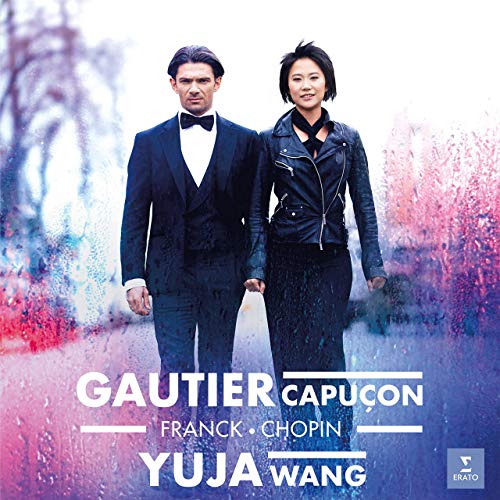CHOPIN Cello Sonata FRANCK Violin Sonata (Capuçon & Wang)
View record and artist detailsRecord and Artist Details
Composer or Director: César Franck, Astor Piazzolla, Fryderyk Chopin
Genre:
Chamber
Label: Erato
Magazine Review Date: 01/2020
Media Format: CD or Download
Media Runtime: 79
Mastering:
DDD
Catalogue Number: 9029539226

Tracks:
| Composition | Artist Credit |
|---|---|
| Sonata for Cello |
César Franck, Composer
César Franck, Composer Gautier Capuçon, Cello Yuja Wang, Piano |
| Introduction and Polonaise brillant |
Fryderyk Chopin, Composer
Fryderyk Chopin, Composer Gautier Capuçon, Cello Yuja Wang, Piano |
| Sonata for Cello and Piano |
Fryderyk Chopin, Composer
Fryderyk Chopin, Composer Gautier Capuçon, Cello |
| (Le) Grand Tango |
Astor Piazzolla, Composer
Astor Piazzolla, Composer Gautier Capuçon, Cello Yuja Wang, Piano |
Author: Jeremy Nicholas
Whether or not Franck originally conceived his Violin Sonata for cello and piano, as now seems probable, the version played here was definitely sanctioned by the composer at the request of his cellist friend Jules Delsart. It is one of those lovable works few can resist whichever of the two instruments it is played on.
However, the performance here is not the most lovable I have heard. Capuçon’s first entry sets the tone for his gruff, blustery approach, aided and abetted by the sound engineering, while the demure and reticent Yuja Wang takes a back seat. It’s as though a bully of a husband constantly interrupts his wife, talks over her and dismisses her contribution, while the wife patiently but persistently continues to put her point of view across. The second movement is allegro, not presto, and surprisingly, given her fabulously fleet fingers, Wang does not articulate the fiery passagework anything like clearly. For that – while retaining the requisite ardency – turn to du Pré and Barenboim (EMI/Warner, 2/73), a real-life husband-and-wife team who had no problem with gender equality either musically or in the recording balance.
The overbearing cello is not quite as prominent in the two Chopin works. In the Introduction of Op 3 Wang, like Argerich with Maisky, shoots off her two opening salvos with tremendous brio (I prefer Franz Rupp’s more measured approach with Emanuel Feurmann back in 1939) while adopting a gentler and altogether lighter touch than Argerich in the Polonaise. Wang’s leggiero and dolcissimo playing is truly gorgeous to hear but does not sit comfortably with the feisty character of her partner.
Strangely, in the Cello Sonata, its first movement notorious for its inbuilt problems regarding the balance between cello and piano, I was not as concerned about this mismatch but became all too aware of the first movement’s length (played with its exposition repeat). Despite the manifest skills of these two musicians on display here, I began wondering how much time they had been able to spend together preparing the work.
Capuçon and Wang conclude their programme with the anachronistic choice of Piazzolla’s Le Grand Tango, a piece they clearly enjoy.
Discover the world's largest classical music catalogue with Presto Music.

Gramophone Digital Club
- Digital Edition
- Digital Archive
- Reviews Database
- Full website access
From £8.75 / month
Subscribe
Gramophone Full Club
- Print Edition
- Digital Edition
- Digital Archive
- Reviews Database
- Full website access
From £11.00 / month
Subscribe
If you are a library, university or other organisation that would be interested in an institutional subscription to Gramophone please click here for further information.




